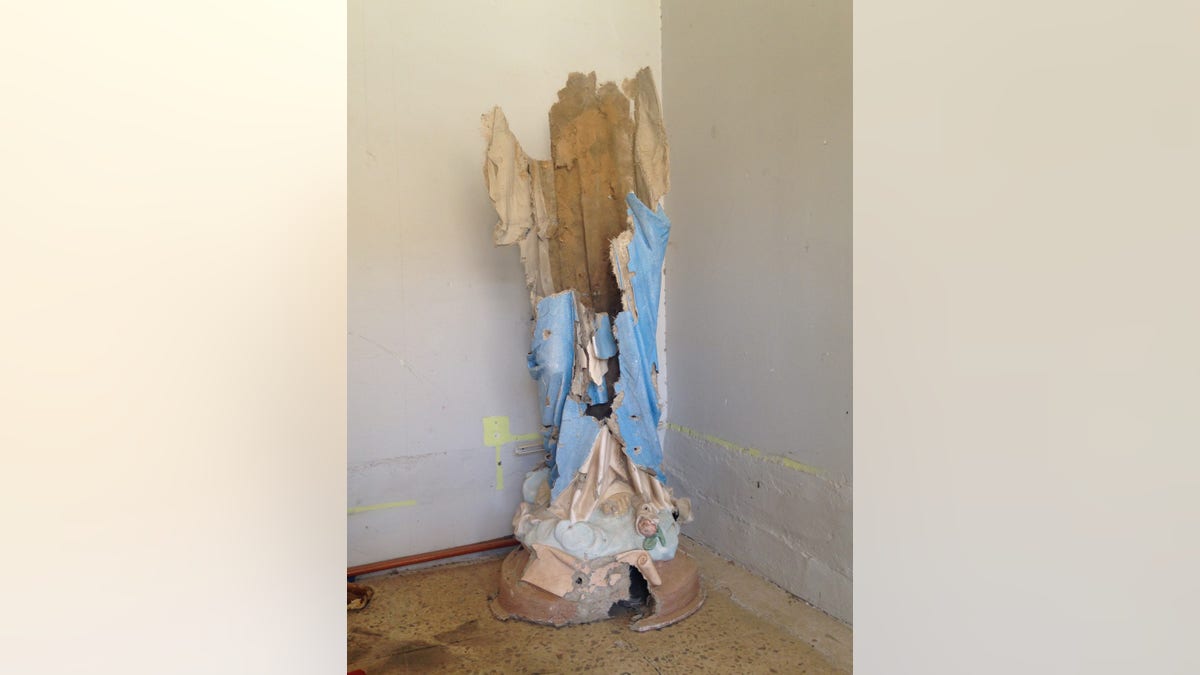
Statue of Mary used as target practice, Batnaya, Nineveh Plain, Iraq.
Two summers ago, the Nineveh Plain lay in ruin, divided by a trench that stretched hundreds of miles across Northern Iraq, through the heartland of what remained of Christianity in Mesopotamia. Telskuf, a once-thriving Christian town, survived two assaults and brief occupations by ISIS. But ISIS had been driven back toward Mosul.
ISIS had come to wage a war of systematic annihilation against the Christians, Yazidis, and other minorities, whose very existence was a threat to the universal jihad. The soldiers of the caliphate wrote as much on the walls of the churches. Most of the Christians had escaped, but not all. From the trenches of Telskuf, one could look to the south toward another Christian village, Batnaya, and only imagine the destruction.
Today, the Nineveh Plain has been liberated from ISIS. Christians are returning to Telskuf and there is hope, though much reconstructive assistance is still needed.
In Batnaya, however, ISIS left the unmistakable mark of the Caliphate: barbarism and desolation. It is, for now, uninhabitable.
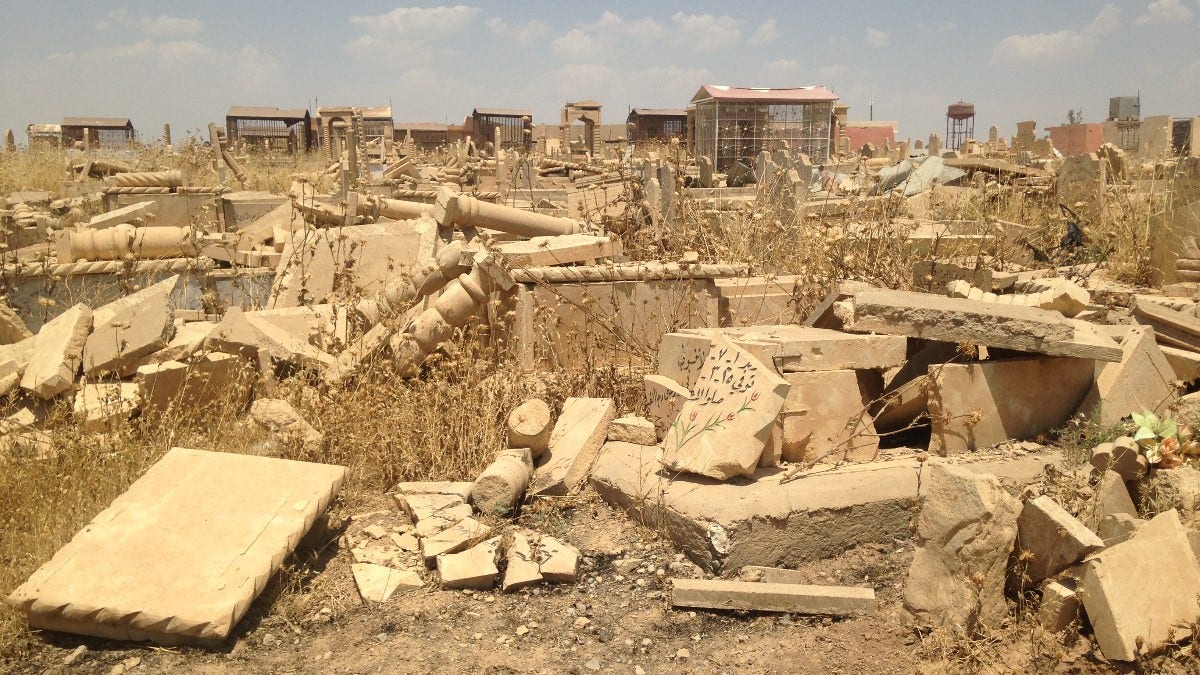
In 2015, I stood in a Christian home in Telksuf that served as a temporary ISIS headquarters before it was leveled by a coalition airstrike that killed several members. Today, standing in another Christian home in Telskuf, there is none of the haunted silence. Nadok, a middle-aged Christian man and leader in his community, bears none of the signs of a genocide victim. He has the gregarious nature of a politician, but the intensity of a soldier—he’s both.
In the end, more than one hundred ISIS fighters were confirmed killed. Sixteen Pehsmerga were also killed and a Navy Seal, Charles Keating IV. Every Christian in this village knows his name.
ISIS smashed his family’s statues of Jesus and Mary, shot his dog, and destroyed his bottles of liquor. Today, the statues and images of Jesus and Mary (and the liquor) have been replaced. Nadok knows that the men who stood in his home are either dead or being hunted down and killed. He and other Christians have returned. He was the first to return to Telskuf and among the first to return to the Nineveh Plain, but will not be the last.
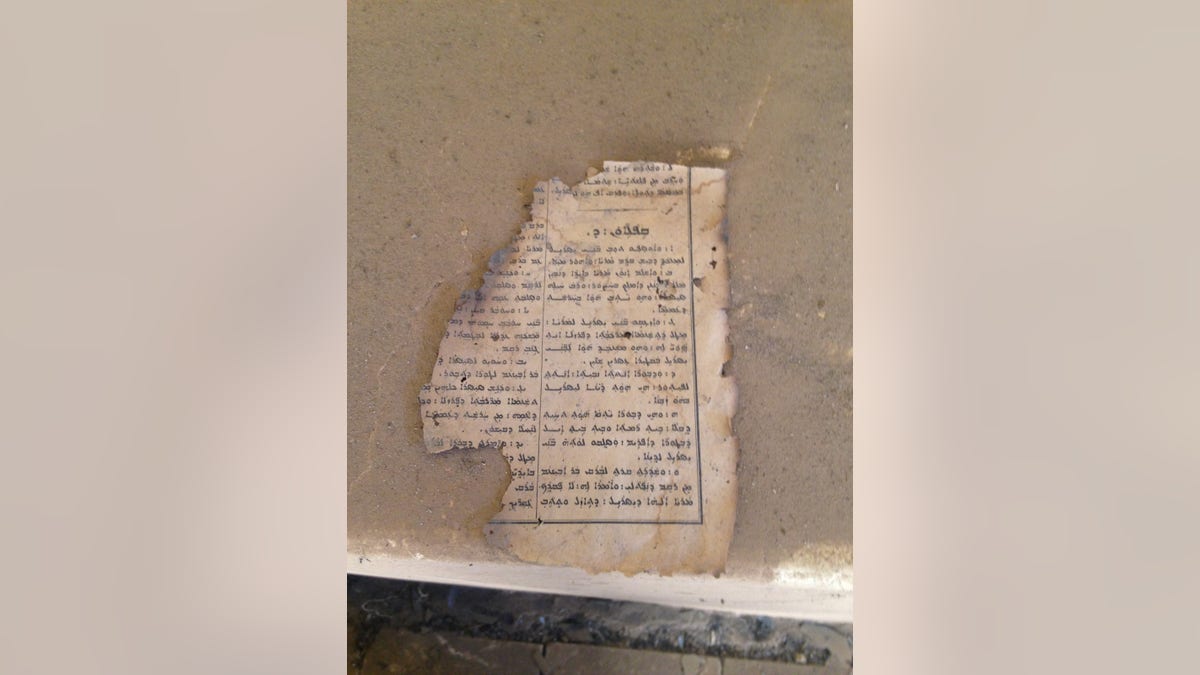
Upon entering his home, which he did when Telskuf was still the front lines, Nadok found that ISIS had left some fresh food behind. Laughing, he recalls, “I phoned friends to tell them to come back and enjoy some Daesh food. They didn’t come.” One senses that the demystification of ISIS is cathartic for this community. But this community knows that they may return one day—and are determined to have security. “We are all grateful to the Peshmerga who liberated our towns, especially those who died for us.”
During much of the ISIS occupation of the Nineveh Plain, Nadok was a soldier. On May 3, 2016, just a few months before Peshmerga liberated the Nineveh Plain, ISIS broke through the lines and, once again, briefly occupied Telskuf. In the end, more than one hundred ISIS fighters were confirmed killed. Sixteen Pehsmerga were also killed and a Navy Seal, Charles Keating IV. Every Christian in this village knows his name.
Nadok, who fought that day, recalls the battle. “Keating was killed by a sniper before the airstrikes.” Nadok shows me where Keating and the Seals were fighting. “We saw the courage of the Navy Seals that day. They came quickly from Barqofa (a neighboring Christian village) when they heard that ISIS had breached the line in Telskuf. They rushed in and held the line by themselves for about ninety minutes. Then the order came to withdraw. ISIS occupied and there was an airstrike. Then the Peshmerga moved back in.”
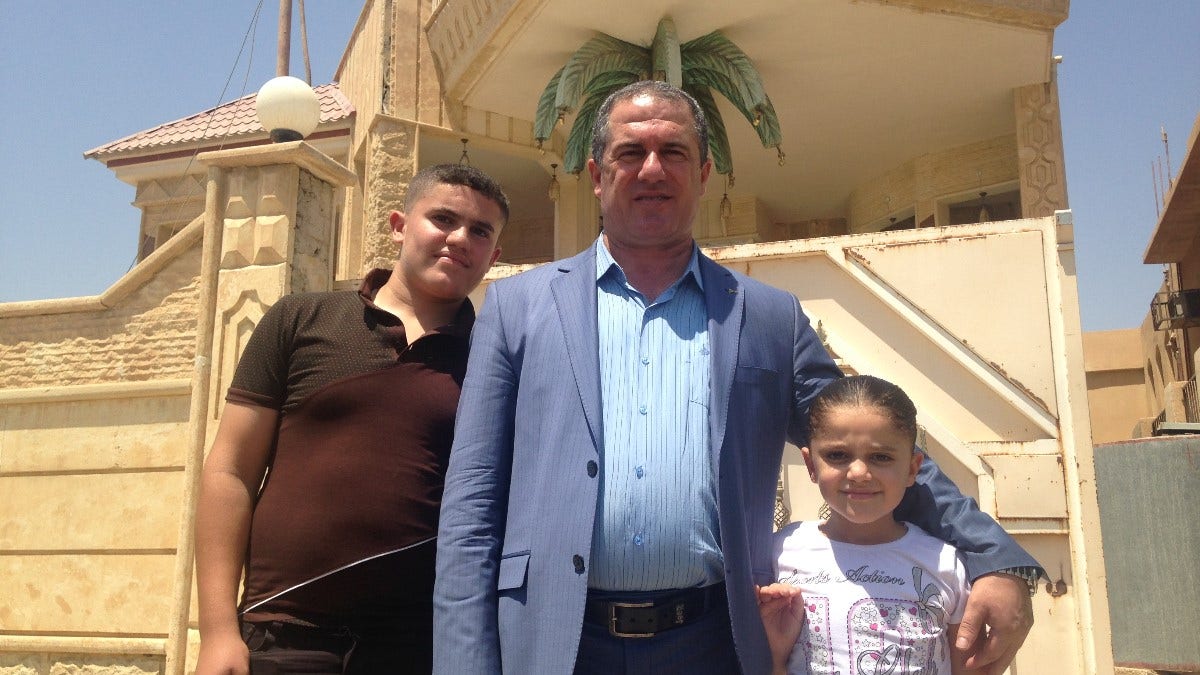
The Peshmerga are gone today, except for a token force. He shows me the photo of his foot on the head of a Deash soldier killed in the May 3 battle. “I’m sorry to show you this. Hopefully it will comfort the mothers of victims.” Charles Keating will not soon be forgotten in Telskuf.
Two years ago, Telskuf was lifeless town with overgrown brush. On this day, there was a flurry of activity. In the town center, a private Canadian charity delivers aid—food, water, generators, air conditioning units. The Christians, like their Yazidi neighbors, desperately need immediate reconstructive aid, which has been slow to arrive, when it arrives at all. But there is a defiance about the Christians: ISIS will not have the last word in this village. They are rebuilding.
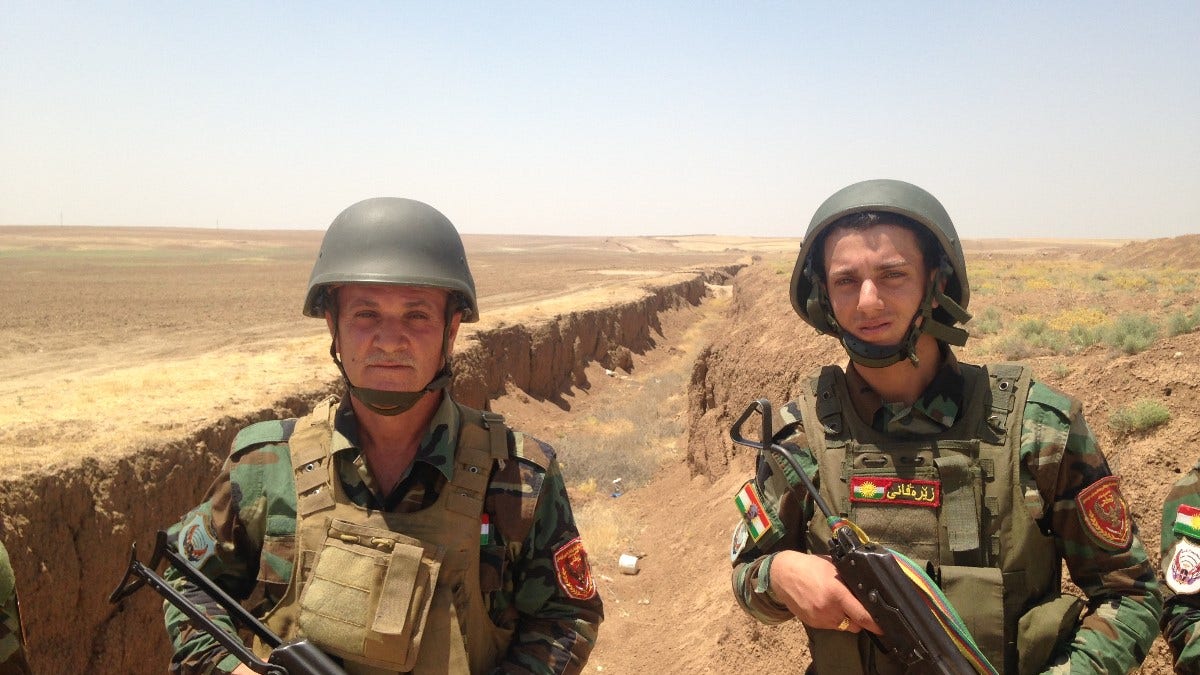
The church of Saint George in Telskuf is filled with workers rebuilding what ISIS destroyed. “They’d used the statutes of Jesus and Mary for target practice. The altar was also destroyed. Daesh knew that the West would be reluctant to bomb a church, so stored food and ammunition here,” says one man from the town. Throughout the church, much of the ISIS graffiti has been removed. The altar is being restored. “To see our Christian symbols again is almost as important as food for us,” says another.
Many families have also begun to return to other villages on the Nineveh Plain. “Thank God we don’t have it as bad in Telskuf as they do in Batnaya” says Nadok. “We’ve opened our doors to them, just as Al Qosh (a Christian city to the north) opened their doors for us when Daesh came.” A Dominican nun on the streets of Ainkhawa, the heavily Christian city north of the Kurdish capital, Erbil, told me days before that she was from Batnaya. It was as if she was saying the name of a deceased loved one.
The destruction in Batnaya is not as devastating as Mosul, but it’s closer than one would’ve imagined. The historic village's walls are filled with caliphate graffiti: “There is no place for the Cross in Islamic lands”; “O Allah, give us martyrdom”; “Office of the mujahedeen”; “Lions of the Caliphate”; “The Cross is under our foot.” Everywhere are the names of ISIS “martyrs.” On the door of the parish priest’s home, “The house of Kafir (infidel).” Across the street, a house for nuns has been destroyed.
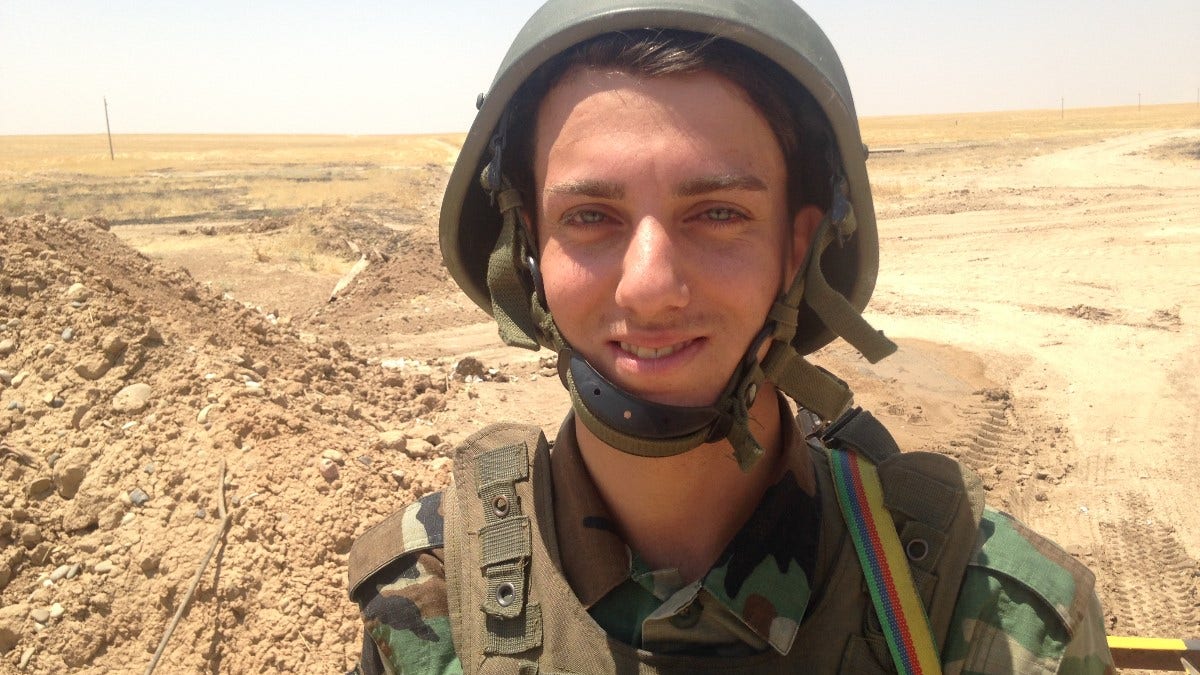
Inside the homes on the way toward the church, one sees the Spartan-like discipline of ISIS, so uncharacteristic for organized militaries in the region, the single-minded focus. They slept on floors even when beds were available. They tunneled and trained by day, slept or attacked by night. Only blankets, bullet-filled statues, and graffiti with the nom de guerre of fallen comrades remain. “Daesh are like ghosts,” says one of the Christians, echoing a sentiment heard from Iraq to Syria.
Inside the church, Saint Kyriakos, there are shot up statues of Jesus and Mary. Across Iraq and Syria, there is writing in Arabic, Russian, French—marks of the universality of the Caliphate. In Saint Kyriakos, there is German. “Oh you Cross worshippers, we’ll kill you all. Germany is an Islamic land. You are weak and don’t belong here.” And: “Oh you Cross worshippers, you have no place in Islamic lands. Either you leave or we’ll kill you.”
ISIS appears to have taken their dead with them. But in the two-year occupation, the graves in the Christian cemetery were desecrated. “ISIS couldn’t have done this by themselves,” says one local Christian leader. “Many locals came from towns nearby when ISIS came to loot and to destroy. ISIS destroyed where their faith required it but they didn’t loot. Locals from the neighboring village took part in the destruction as well. This is what we believe.” The Christians here are open to reconciliation with neighbors—but will trust only their own police and defense forces. “Our own neighbors turned on us overnight. We won’t let that happen again.”
The ISIS assault against minorities is part of a wider Islamist campaign to subjugate or simply eradicate religious minorities in the region. The State Department (begrudgingly) acknowledged last year that this systematic pattern, which included slavery, rape, and murder, constituted genocide, confirming what Congress had found unanimously the week before. Secretary of State Rex Tillerson recently clarified the U.S. government's position, following omissions of the term earlier this year in country reports for 2016 on Iraq and Syria. One U.S. official last year voiced concern about Iraqi Christians seeking revenge against Sunni Arabs in a private meeting -- a fear without any basis in reality or history.
There is no talk of reprisals by Christians. They simply want to provide for their own security—to ensure that it doesn’t happen again. How less forgiving Americans would be, I thought, listening to these Christians. It is precisely the Christian tendency to reconcile, to forgive, that makes them vulnerable to exploitation, to absurd lectures from an American official not to exact revenge on their neighbors.
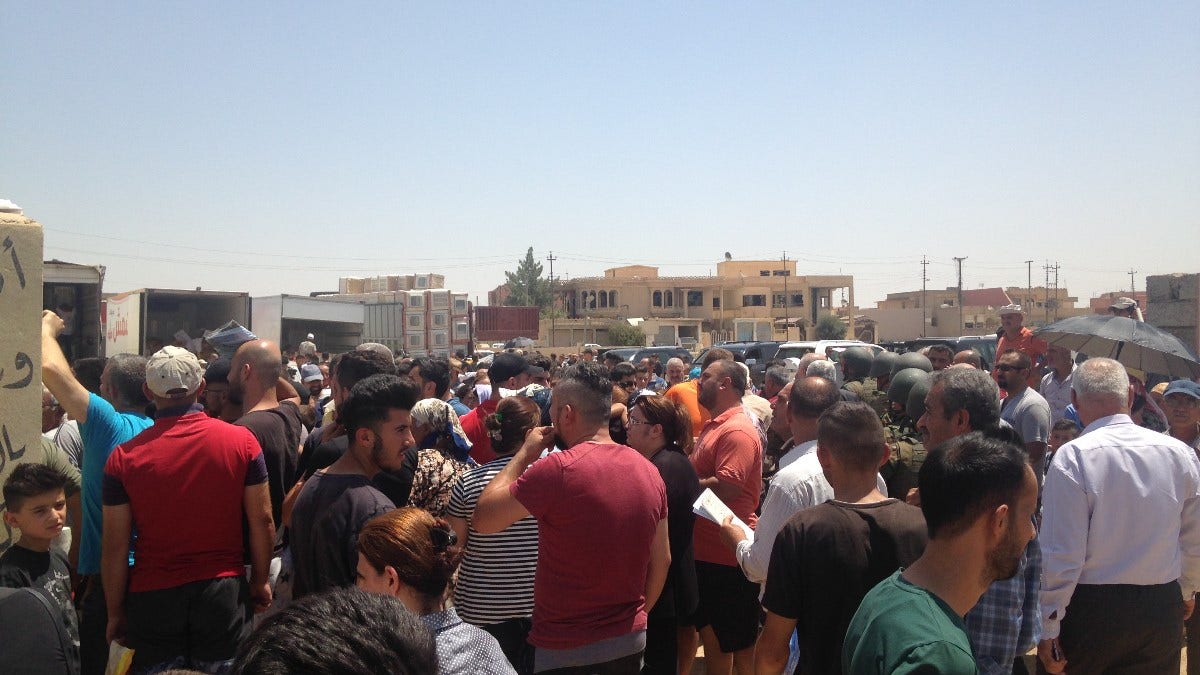
Later that day, Christian leaders in Dohuk ask candidly whether the Trump Administration will help them. After years of neglect from the Bush and Obama administrations, the Christians of the region went all-in for Trump and remain unabashed supporters. Middle East Christians in America overwhelmingly supported Donald Trump in the 2016 election, particularly in key swing states like Michigan, Ohio, and Pennsylvania. They are growing concerned that they may once again become an afterthought—but they haven’t lost hope.
“We believe in God first, Trump second,” says one of the Christian leaders in Dohuh. “You hear it said often here. You see, we are caught between Arabs and Kurds, between Sunni and Shia, between Turkey and Iran. Without a province, doomed.”
The future of the Nineveh Plain will be decided as much in Washington as it is in Northern Iraq. To the extent that Christians have a voice in their own future, they will likely opt for the creation of a province, perhaps with a path toward an autonomous zone, like that which was created to protect Iraq’s Kurds in 1991. On September 25, Iraq’s Kurds will vote in a referendum on independence.
Iraq’s Christians don’t ask for continuous aid or for any special status. “We seek only equal rights and the ability to protect ourselves,” says one community leader. “We can provide for our own defense and build our own economy.” After the 2003 invasion, America made no special accommodation for the Christians. In 2014, no military action was taken to stop the ISIS conquest of Christian Nineveh, though it could’ve been done easily—and prevented genocide. The Trump Administration is now the last, best hope for Christianity in Iraq. The Christians there watch and wait.
Andrew Doran writes about U.S. foreign policy and human rights in the Middle East.








































